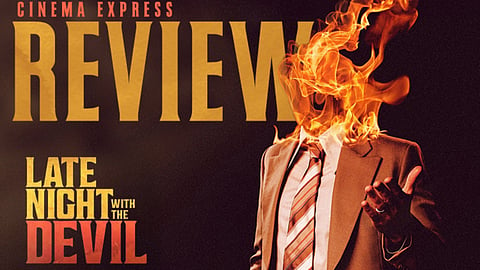Late Night with the Devil Movie Review: A scathing satire on television disguised as a horror film
Late Night With The Devil(3.5 / 5)
Fear is a hot commodity this summer, with many horror films hitting theatres in quick succession. But Late Night with the Devil is different from conventional horror cinema in that it uses the genre to enlighten the audience with a scathing commentary on the television industry rather than merely induce fear among them with jump scares. The film, from directors Colin Cairnes and Cameron Cairnes, explores the dark underbelly of television business in the guise of a horror feature.
Direction: Colin Cairnes and Cameron Cairnes
Cast: David Dastmalchian, Laura Gordon, Ingrid Torelli
The film stars David Dastmalchian as Jack Delroy, the host of a TV show called Night Owls that caters to an audience craving entertainment. It begins with a monologue painting a picture of an America with exorbitant gasoline prices, socio-political upheaval, and unrest in the streets. Television is the sole source of entertainment for the audience, and late-night shows such as Night Owls appeal to the masses and offer them some relief from the daily grind. Delroy pitches Night Owls as a competitor to The Tonight Show Starring Johnny Carson, and his solo and collaborative gags initially contribute to the big money the producers seek. However, soon, its ratings come down and sales plummet, forcing Delroy to revisit his strategy. The new strategy includes hosting an episode with occult practitioners for Halloween, with a live seance by Fayssal Bazzi’s Christou, as well as an exorcism from parapsychologist June Ross-Mitchell (Laura Gordon) on her subject Lilly D'Abo (Ingrid Torelli). Soon, the lines between reality and performance begin to blur, and the characters reel in the aftermath of an inexplicable phenomenon.
The film makes you wonder whether its exorcism and seance are staged entertainment or real, and whether some of the central characters are having a normal mental breakdown or caught in the whirlwind of the occult. Discerning viewers will realise that the devil is in the details and that the system is more sinister than any demon. David Dastmalchian often plays Delroy as the demented offspring of Jake Gyllenhaal’s Lou Bloom from Nightcrawler, a man preoccupied with the idea of rising to the top of TV journalism even at the altar of morals and ethics. In many weird ways, Delroy’s transition from the Night Owls host and a casual observer of the events in the show to an active participant in the corrupt and crooked system, has its parallels to Bloom and his nocturnal hell. There is one crucial difference, though. It does not celebrate its central character quite like Nightcrawler does. It explores the dark side of ambition and the repercussions of seeking success at any cost. Its rendering of 1970s late-night television aesthetics is authentic and believable, and the blending of horror with mockumentary-style filmmaking is fascinating.
Further, the Cairnes brothers’ screenplay has many horror film callbacks that turn watching it on screen into a spot-the-reference exercise. In an early scene, as he begins to wonder how to add drama to his show, Delroy lets out the rhetoric: “Where is Vincent Price when you need him?” The tall, lanky Price was a Hollywood horror icon known for his effective integration of humour and histrionics into his characters and for being a familiar face in American late night shows. Further, the girl, susceptible to ghostly activity who becomes a conduit for a malevolent spirit, reminds one of writer Steven Spielberg’s Poltergeist, as do the countless scenes where she levitates in the show within the film. A late Exorcist reference, “The power of Christ compels you,” induces a small amount of fear and evokes laughter in equal measure. With such callbacks, the film becomes a complete commentary on the 1970s cultural climate and the allure of the occult. Ian Bliss’s Carmichael the Conjurer is a character who questions the allure in a way that reflects the 70s skepticism about the occult. For example, the skeptic viewpoint was shared by some prominent figures like Carl Sagan and James Randi.
The climax goes a tad overboard with its metaphorical exploration of television and its sensationalism, but it still has a suspenseful use of the “it is all just a dream” trope in horror cinema. All in all, Late Night with the Devil maintains its sense of unrest and suspense almost throughout its runtime, making it a hell of a good time in the theatres.

